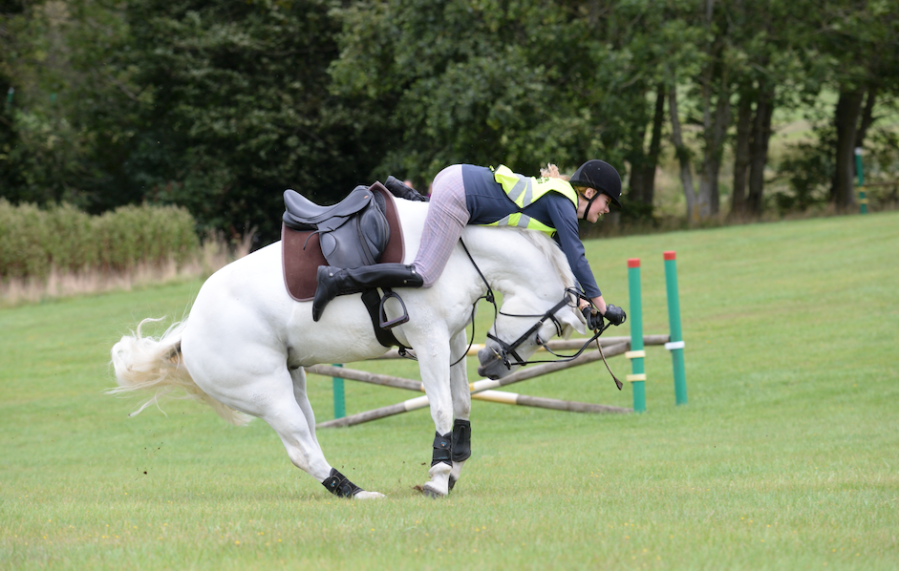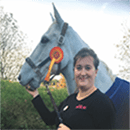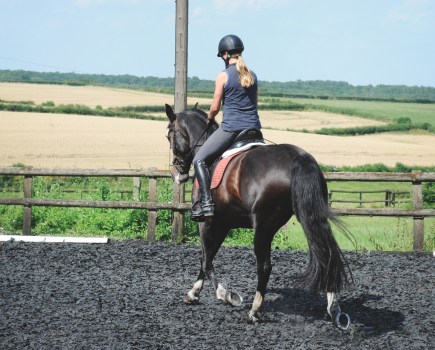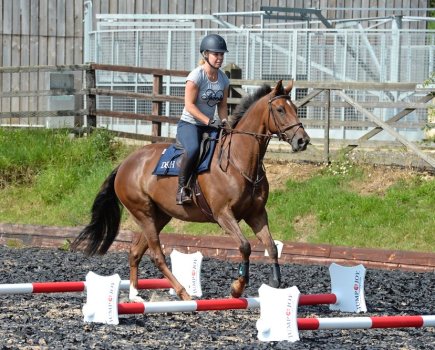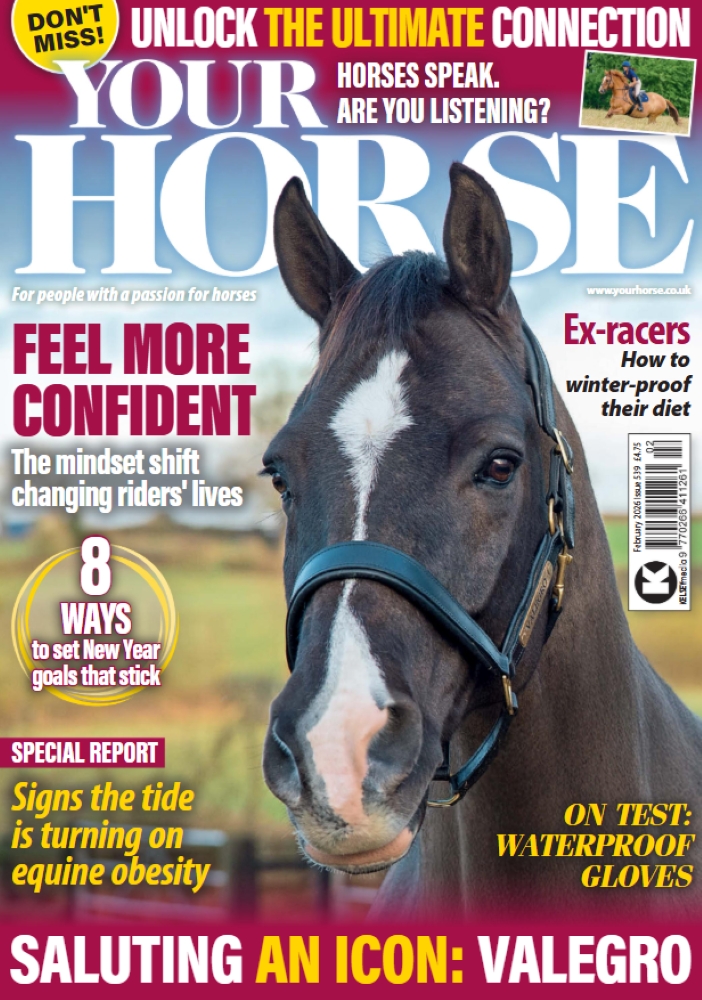Would you consider yourself to be a nervous horse rider — or perhaps there is something in particular that triggers an attack of nerves?
Falling off goes with the territory when you ride horses, but many riders (of all levels) experience a particularly bad fall or incident at some point and it takes time to recover from it.
I know this because it happened to me. At my first British Eventing fixture many years ago, a rotational fall at an offset double of palisades when we got to it on a half-stride temporarily ended my love of jumping.
It was a considerable length of time before I would even jump a cross-pole.
When confidence is at an all-time low and the ‘survival brain’ kicks in it can be difficult to see a way forward to enjoying riding again — or perhaps even to get back in the saddle at all.
I continued to enjoy things like hacking, hunting, and riding racehorses up the gallops after my fall. But ask me to jump and I just could not do it.
My mind was awash with self-doubt and questions about my ability: “what if he stops?”, “what if I fall off?”, “what if the stride is wrong?”, “what if we get hurt?”
Your survival brain
According to Dr Krissie Ivings, a consultant clinical psychologist, cognitive behavioural hypnotherapist, and author, your survival brain can be retrained following a confidence-denting incident.
She advises that while returning to riding after an accident is difficult, it is also really common and definitely something you can work to get past — and that is very good news!
“Anxiety management is a big part of my work, and that includes helping people who are frightened after accidents and near misses,” says Krissie.
“I think the key point is that you find yourself making excuses [for not riding or doing the activity that scares you]. We think that it is us thinking these things, but it is actually our survival brain, which I call ‘the chimp’.”
Your inner chimp
Krissie explains that the chimp operates according to a simple system.
“Whatever you do that creates anxiety, the chimp will assume to be dangerous, and whatever reduces anxiety he assumes makes the danger go away,” she says.
“It has evolved to spot and avoid problems to keep you safe.
“I experienced this myself after having a rotational fall when jumping and realised that when I came back to riding I had become reluctant to jump,” continues Krissie.
“I would think, “I’m not really into jumping anymore”, or “I just prefer hacking now”.
“There is nothing wrong with these thoughts, but they weren’t true. They were rationalisations to justify not jumping and to stop me from asking myself why — [I was] coming up with excuses not to ride.”
Taming the chimp
To tame the chimp, you need to address four things:
- Deal with the physiological changes and calm your body.
- Soothe the chimp by addressing danger thoughts and thinking more rationally and positively.
- Reduce the sense of threat to reduce fear.
- Stop obeying the chimp when you have the urge to avoid riding.
“Essentially, the chimp needs to relearn that you are competent and capable, so the secret to success is getting back on board using a process called graded exposure,” says Krissie.
This is how to do it:
Rate your anxiety on a scale of 1-10
1 means no anxiety at all while 10 is being totally overwhelmed.
Run through a feared situation in your mind
“Mentally run through a feared situation and work out at which point your anxiety rises, but doesn’t go so high that you are too overwhelmed to continue,” says Krissie.
“This could be standing at a mounting block, walking on the lead rein, or jumping a cross-pole.”
Try the activity that scares you
While doing it, rate your anxiety from 1-10.
“You will probably find that your anxiety goes up, stays the same, and then begins to drop,” says Krissie.
“Stay with the activity until the anxiety has dropped. It is your anxiety dropping while you are doing the thing that scares you that rewires the chimp brain and helps it to reevaluate what is and isn’t dangerous.”
Recognise when your anxiety levels drop
“Once your anxiety has dropped below a 5 on your scale, or has dropped at least three points from where you began, stop the task and take a break, then repeat,” advises Krissie.
“The key to success is repeated, prolonged exposure as the chimp learns through experience.”
Reevaluating risk
It doesn’t matter how slow you take this process or at what level you start — the most important thing is that you do begin somewhere.
“After an accident it is entirely natural that when you come to ride or repeat what you were doing at the time you got hurt, anxiety will be generated,” says Krissie.
“The chimp’s most recent experience is negative, so it has decided that riding is a bad idea. However, if you work through that and have a series
of successful outings, the chimp reevaluates the risk and calms down.
“Be patient. String together 15-20 positive experiences and you will start to notice a difference.”
Unresolved trauma
A caveat to this, cautions Krissie, is unresolved trauma.
“Most accidents are frightening or painful and may lead to more anxiety afterwards. If the person doesn’t deal with the trauma but shuts down thoughts of the accident, those memories can remain live and active,” she states.
“It can feel as if the whole event has been frozen in time.
“When memories are triggered, a person can re-experience elements of the accident in vivid detail. It can even feel as if the awful experiences are being replayed in the present.
“If this is happening to you, the anxiety won’t habituate, as those trauma memories are keeping the sense of threat alive.”
Signs that you have it
Evidence of unresolved trauma includes:
- Persistent re-experiencing of elements of the accident when you try to ride.
- Unusually vivid recollections, sometimes also including different senses, such as sensations in your body or smells.
- Intense emotion when memories are triggered.
- A sense that the traumatic incident was very recent, even if it happened years ago.
- Avoidance of reminders of the accident.
- Difficulty talking about it, and a wish to push memories away.
- A sense of threat/jumpiness.
- Irritability and low mood.
If you feel that you are struggling with unresolved trauma seek support from a mental professional.
Dr Krissie Ivings owns Aspire Equestrian and works with athletes from amateur to elite level, specialising in helping nervous riders.
Main image © Your Horse Library/Kelsey Media Ltd

